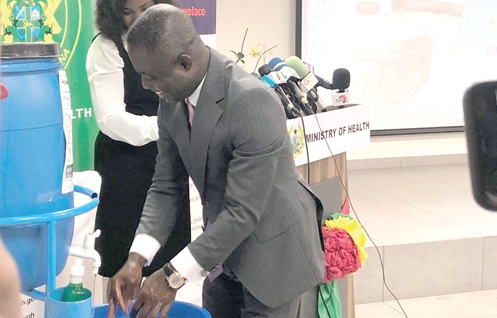This year’s National Hand Hygiene Day has been commemorated, with the Minister of Health, Kwabena Mintah Akandoh, demonstrating proper hand washing techniques to highlight the importance of the occasion.
The event, which was on the theme: “It might be gloves, it’s always hand hygiene,” was observed in Accra yesterday, and participated in by stakeholders in health, sanitation, education, among others.
It aimed at re-enforcing the critical importance of hand hygiene as a tool for infection prevention and control (IPC) in healthcare and community settings.
The event was organised by the Ministry of Health, in collaboration with the World Health Organisation (WHO), Stanbic Bank, Community Water and Sanitation Agency and Anglogold Ashanti.
Significance
Mr Akandoh emphasised the significance of proper hand hygiene in safeguarding public health, particularly in the wake of recent disease outbreaks such as COVID-19 and the persistent threat of a communicable disease like cholera.
“Clean hands save lives. Hand hygiene must become second nature to every citizen from the clinic to the market,” he said.
The minister further advised the public to make hand washing a routine practice.
Mr Akandoh said the ministry would continue to work with its partners to ensure the implementation of the national IPC strategy by resourcing healthcare facilities with the necessary infrastructure and materials to support effective hand hygiene.
Healthcare waste
The Emergency Preparedness and Response Officer of WHO, Dr Sally Ann Ohene, commended MoH for the event, adding that the theme emphasised the importance of maintaining proper hand hygiene at all times regardless of the use of gloves.
She said that while gloves were a critical part of personal protective equipment, they must be used appropriately to avoid unnecessary waste.
Dr Ohene said the excessive use of gloves contributed significantly to healthcare waste, adding that an average university hospital generated about 1,634 tons of healthcare waste annually.
She, therefore, encouraged healthcare facility managers to make hand hygiene part of everyday routine by providing training and practical resources to employees.
Hand hygiene items
A member of the national IPC committee, Serwaa Amoah, said in 2017, only 15 per cent of healthcare facilities in the country had all the necessary hand hygiene items. However, in 2024, it had increased to 54 per cent.
Ms Amoah, therefore, called for a renewed mindset, stressing that hand hygiene was not only a medical requirement but a moral responsibility.
“These hands that heal can also harm if we don’t use them properly,” she said.

